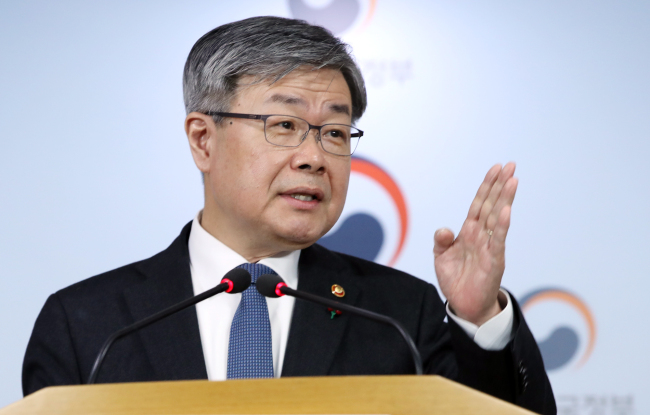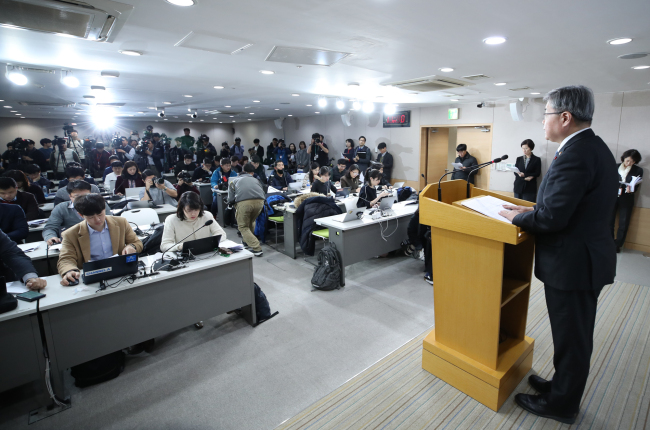[Newsmaker] Govt. to reflect hours of paid rest in calculating minimum wage
By Park Ju-youngPublished : Dec. 24, 2018 - 15:15
Legal hours of paid rest will be reflected in the calculation of minimum wage from 2019, the government said Monday. However, extra hours of paid rest designated by contracts between companies and labor unions will not be included in working hours when calculating the minimum wage.
According to the Ministry of Employment and Labor, a Cabinet meeting held Monday discussed the revised enforcement ordinance of the Minimum Wage Act. The enforcement ordinance centers on recognizing hours of paid rest as working hours in the minimum wage calculation.
According to the Ministry of Employment and Labor, a Cabinet meeting held Monday discussed the revised enforcement ordinance of the Minimum Wage Act. The enforcement ordinance centers on recognizing hours of paid rest as working hours in the minimum wage calculation.

Under the labor law in Korea, an employer must give at least eight hours of paid rest every week, mostly on Sundays, if an employee works more than 15 hours a week. Some large Korean companies give an extra eight hours of paid rest, mostly on Saturdays and Sundays, according to contracts they made with labor unions.
The minimum wage in Korea is calculated by dividing a monthly wage by the number of working hours. Currently, working hours include actual paid working hours only, but the Labor Ministry has argued that hours of paid rest should be included as well.
The business circle, however, has voiced concerns about the ministry’s plan, as it would impose greater financial burden on employers. According to the method of calculating the minimum wage, the wage will increase if working hours expand.
For example, if hours of paid rest are not considered working hours, the hourly wage for a worker who receives 1.7 million won ($1,500) a month would be 9,770 won, which is more than next year’s minimum wage of 8,350 won.
However, if 16 hours of paid rest are included as part of working hours, the hourly wage drops to 8,134 won, less than the minimum wage. In such a situation, an employer needs to raise workers’ pay to avoid a penalty from violating the Minimum Wages Act.
During the Cabinet meeting Monday, the government decided to recognize legal hours of paid rest as working hours, while excluding extra hours of paid rest from the minimum wage calculation.
“During the discussion, concerns were raised that the business circle’s financial burden would increase if working hours include extra hours of paid rest as well as legal hours of paid rest,” Labor Minister Lee Jae-gap said during a briefing Monday.
“Reflecting employers’ requests, the government has revised the enforcement ordinance.”
The revised version of the enforcement ordinance will be discussed and approved at a Cabinet meeting on Dec. 31.

Meanwhile, the ministry also revealed its plan on implementing reduced work hours.
As part of efforts to ease the problem of chronic overwork in the country, the government has limited the maximum workweek to 52 hours since July. The new law has taken effect for businesses with more than 300 workers.
“The government has worked on settling the reduced work hours in workplaces, but some companies are still struggling to reduce workhours,” the minister said.
The ministry said it would allow extra months to implement the new plans in such workplaces. The grace period will be extended from December this year to March 2019, while companies with flexible work hour systems will be allowed more time until the revised law takes effect.
By Park Ju-young (jupark@heraldcorp.com)







![[Graphic News] More Koreans say they plan long-distance trips this year](http://res.heraldm.com/phpwas/restmb_idxmake.php?idx=644&simg=/content/image/2024/04/17/20240417050828_0.gif&u=)
![[KH Explains] Hyundai's full hybrid edge to pay off amid slow transition to pure EVs](http://res.heraldm.com/phpwas/restmb_idxmake.php?idx=644&simg=/content/image/2024/04/18/20240418050645_0.jpg&u=20240419100350)







![[KH Explains] Hyundai's full hybrid edge to pay off amid slow transition to pure EVs](http://res.heraldm.com/phpwas/restmb_idxmake.php?idx=652&simg=/content/image/2024/04/18/20240418050645_0.jpg&u=20240419100350)

![[Today’s K-pop] Illit drops debut single remix](http://res.heraldm.com/phpwas/restmb_idxmake.php?idx=642&simg=/content/image/2024/04/19/20240419050612_0.jpg&u=)